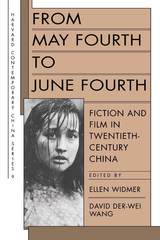
For much of the twentieth century, the May Fourth movement of 1919 was seen as the foundational moment of modernity in China. Recent examinations of literary and cultural modernity in China have, however, led to a questioning of this view. By approaching May Fourth from novel perspectives, the authors of the eight studies in this volume seek to contribute to the ongoing critique of the movement.
The essays are centered on the intellectual and cultural/historical motivations and practices behind May Fourth discourse and highlight issues such as strategies of discourse formation, scholarly methodologies, rhetorical dispositions, the manipulation of historical sources, and the construction of modernity by means of the reification of China’s literary past.

Women entered the book trade in significant numbers in China during the late sixteenth century, when it became acceptable for women from “good families” to write poetry and seek to publish their collected poems. At about the same time, a boom in the publication of fiction began, and semiprofessional novelists emerged.
This study begins with three case studies, each of which probes one facet of the relationship between women and fiction in the early nineteenth century. It examines in turn the prefaces written by four women for a novel about women; the activities of a woman editor and writer of fiction; and writings on fiction by three leading literary women. Building on these case studies, the second half of the book focuses on the many sequels to the Dream of the Red Chamber—one of which was demonstrably written by a woman—and the significance of this novel for women. As Ellen Widmer shows, by the end of the century, women were becoming increasingly involved in the novel as critical readers, writers, and editors. And if women and their relationship to fiction changed over the nineteenth century, the novel changed as well, not the least in its growing recognition of the importance of female readers.


What do the Chinese literature and film inspired by the Cultural Revolution (1966–1976) have in common with the Chinese literature and film of the May Fourth movement (1918–1930)? This new book demonstrates that these two periods of the highest literary and cinematic creativity in twentieth-century China share several aims: to liberate these narrative arts from previous aesthetic orthodoxies, to draw on foreign sources for inspiration, and to free individuals from social conformity.
Although these consistencies seem readily apparent, with a sharper focus the distinguished contributors to this volume reveal that in many ways discontinuity, not continuity, prevails. Their analysis illuminates the powerful meeting place of language, imagery, and narrative with politics, history, and ideology in twentieth-century China.
Drawing on a wide range of methodologies, from formal analysis to feminist criticism, from deconstruction to cultural critique, the authors demonstrate that the scholarship of modern Chinese literature and film has become integral to contemporary critical discourse. They respond to Eurocentric theories, but their ultimate concern is literature and film in China’s unique historical context. The volume illustrates three general issues preoccupying this century’s scholars: the conflict of the rural search for roots and the native soil movement versus the new strains of urban exoticism; the diacritics of voice, narrative mode, and intertextuality; and the reintroduction of issues surrounding gender and subjectivity.


The collapse of the Ming dynasty and the Manchu conquest of China were traumatic experiences for Chinese intellectuals, not only because of the many decades of destructive warfare but also because of the adjustments necessary to life under a foreign regime. History became a defining subject in their writings, and it went on shaping literary production in succeeding generations as the Ming continued to be remembered, re-imagined, and refigured on new terms.
The twelve chapters in this volume and the introductory essays on early Qing poetry, prose, and drama understand the writings of this era wholly or in part as attempts to recover from or transcend the trauma of the transition years. By the end of the seventeenth century, the sense of trauma had diminished, and a mood of accommodation had taken hold. Varying shades of lament or reconciliation, critical or nostalgic retrospection on the Ming, and rejection or acceptance of the new order distinguish the many voices in these writings.

Speaking about Chinese writing entails thinking about how writing speaks through various media. In the guises of the written character and its imprints, traces, or ruins, writing is more than textuality. The goal of this volume is to consider the relationship of writing to materiality in China’s literary history and to ponder the physical aspects of the production and circulation of writing. To speak of the thing-ness of writing is to understand it as a thing in constant motion, transported from one place or time to another, one genre or medium to another, one person or public to another.
Thinking about writing as the material product of a culture shifts the emphasis from the author as the creator and ultimate arbiter of a text’s meaning to the editors, publishers, collectors, and readers through whose hands a text is reshaped, disseminated, and given new meanings. By yoking writing and materiality, the contributors to this volume aim to bypass the tendency to oppose form and content, words and things, documents and artifacts, to rethink key issues in the interpretation of Chinese literary and visual culture.
READERS
Browse our collection.
PUBLISHERS
See BiblioVault's publisher services.
STUDENT SERVICES
Files for college accessibility offices.
UChicago Accessibility Resources
home | accessibility | search | about | contact us
BiblioVault ® 2001 - 2024
The University of Chicago Press









